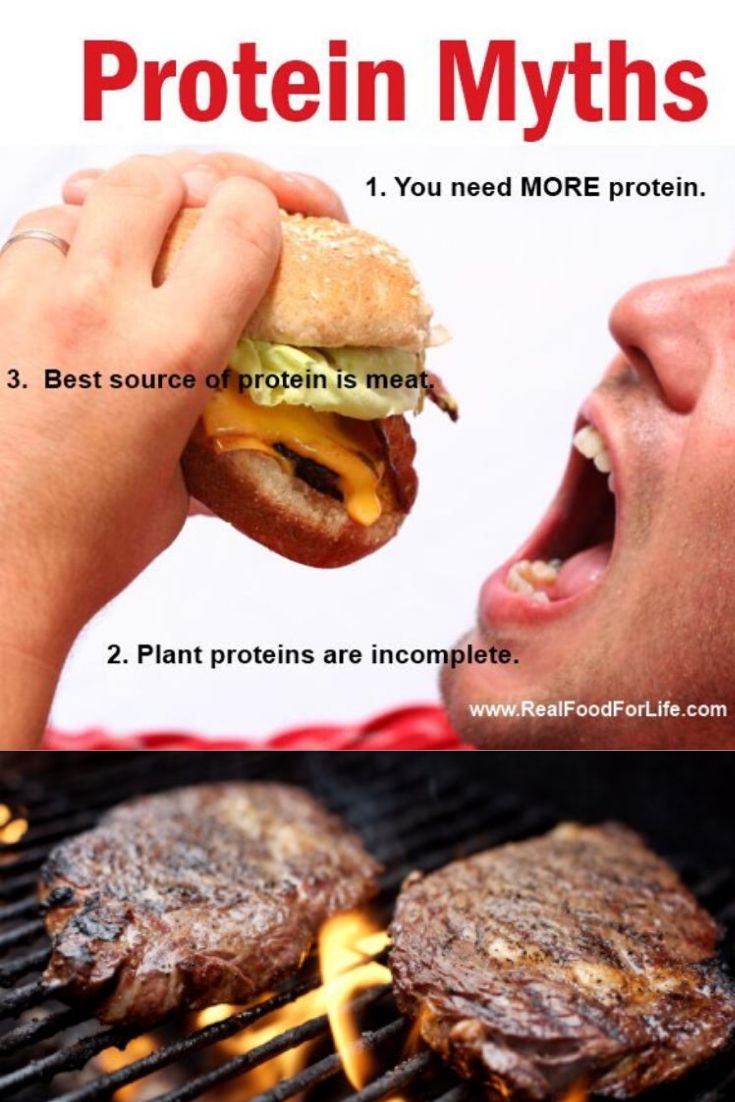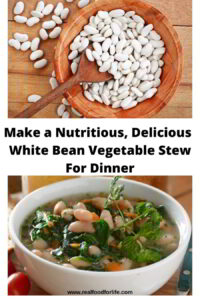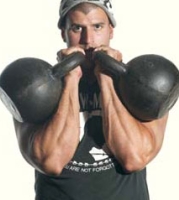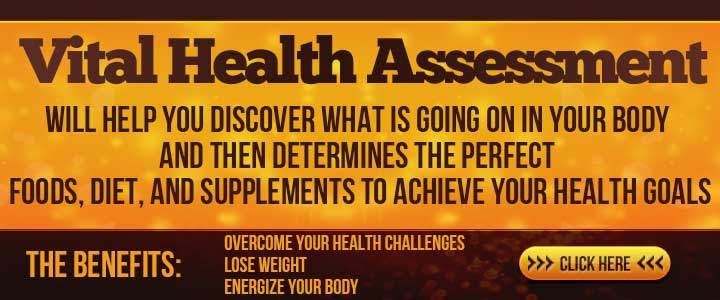The protein myth in North America is huge! We are obsessed with protein. Discover the myths you may have about this important topic and the surprising truth.

Protein Myths
Myth #1 You need more protein to be healthy and strong.
Truth: The average man in the US eats 175% more protein than the recommended daily allowance and the average woman eats 144% more. Surgeon General’s Report, 1988
Myth #2 Plant proteins are incomplete and need to be complemented for adequate protein.
Truth: All vegetables and grains contain eight of the essential amino acids and the 12 other nonessential ones. Beans have more protein per calorie than meat.
Myth #3 To build muscle you need lots of protein daily. (Bodybuilders say you need 30% -40 % protein or more!)
Truth: Athletes and very active people only need 1.6-1.8 g/kg BW per day says research but inactive people need less. Human breast milk is only about 6% protein and a baby grows lots of lean tissue on a diet of exclusively mother’s milk.
Myth #4 The best place to get protein is from meat.
Truth: Moderate consumption of red meat, as little as one serving a day poses a more serious health risk than first thought. ~ Research from the Harvard School of Public Health.
There has been too much focus on protein in the diet!
Protein is needed by every living cell for structural and functional purposes and also we need carbohydrates, vitamins, minerals, antioxidants, phytochemicals and healthy oils for the body to fully function. A balanced diet with a range of whole foods is needed for a healthy body.
One of the major reasons the average diet is so poor is that we equate protein with good nutrition and think animal products are the only way to get it into our diet.
Vegetables, whole grains, beans, nuts, and seeds are filled with good protein. Green vegetables, peas and beans have more protein per calorie than meat and plant food proteins are rich in nutrients and phytochemicals and low in calories. Even fruit has small amounts of protein. There are no antioxidants and phytochemicals in animal foods.
People do not die from protein deficiency in the western world.
Visit any U.S. hospital and ask:
“How many patients occupy beds here because they do not eat enough protein?”
The answer you will get is, “Zero.”
Hospitals are filled with Americans who have eaten too much dietary animal protein.
- High Protein Diets may shrink the brain as well as the waistline, raising the risk of Alzheimer’s disease in later life.
- Eating protein in excess of the body’s needs creates extra work for the liver.
- “The weight of the evidence certainly points to a link between high-protein foods and resultant cancers.” Dr. Colin Campbell
- Too much protein in your diet can cause your body to produce too many organic compounds in the bloodstream that is a by-product of abnormal fat metabolism, which can cause organs to fail and result in gout, kidney stones, or kidney failure. Cleveland Clinic’s nutrition experts say.
We are getting too much protein….yes too much!!!
“The real cause of heart disease is excess animal protein, processed carbohydrates and sugar. The cause of heart attacks is actually the excess of stored animal protein in the interstitial space between heart muscle cells.” ~ Swedish scientist Uffe Ravnskov, MD, Ph.D.
How much protein is enough?
The amount per day:
- 160-pound man needs about 58 grams
- 120-pound woman needs about 43 grams
(National Academy of Sciences)
Eat 2 – 4 servings of fruits, 3 -5 servings of vegetables, and 6 – 11 servings of whole grains and your diet will include substantial amounts of vegetable protein.
World’s Most Recognized Vegan body Builder Tells All

Robert Cheeke’s story sounds like it was made up just to inspire others.
He was a cliche; the skinniest kid in the class who wanted to become something better.
He did so, became a world-class bodybuilder as a vegan and then began to gather all the other vegan bodybuilders and athletes together to inspire the rest of the world.
Listen to how Robert Changed his life:
Hear more: Robert Cheeke Interview
Another Vegetarian STRONG GUY Diana Interviewed:
Mike Mahler Fitness and Health Trainer
Mike is highly regarded by top fitness trainers and athletes in the world.
Listen to what he had to say about …Read Food for Life, eating right, being vegetarian, and how to achieve your health and life goals. Mike Mahler Aggressive Strength Interview
High Protein Vegetarian Recipes
 White Bean Vegetable Stew– How about a very yummy, healthy protein meal filled with vegetables. This stew is high in potassium for those of you who need a boost in that area. Also, half a cup of white beans is loaded with close to 100 mg of calcium.
White Bean Vegetable Stew– How about a very yummy, healthy protein meal filled with vegetables. This stew is high in potassium for those of you who need a boost in that area. Also, half a cup of white beans is loaded with close to 100 mg of calcium.
Adzuki Bean Vegetable Stew – This is a simple recipe with one of the easiest to digest beans; adzuki beans. I love Adzuki beans and this tasty stew is filling and delicious.
 Spring White Bean and Asparagus Stew– How about a very yummy, healthy protein meal filled with vegetables. This stew is high in potassium for those of you who need a boost in that area. Also, half a cup of white beans is loaded with close to 100 mg of calcium.
Spring White Bean and Asparagus Stew– How about a very yummy, healthy protein meal filled with vegetables. This stew is high in potassium for those of you who need a boost in that area. Also, half a cup of white beans is loaded with close to 100 mg of calcium.
Red Lentil Soup: This is fast and tasty! Everyone needs to know about lentils.
Creamy Butter Bean Dip – This butter bean dip is a very tasty, healthy and vegan. The creamy texture makes it good for a dip. Also, very easy to make.
Delicious Black Bean Stew – This black bean stew is so good for a cold fall or winter day. It is delicious and easy to make and filled with nutritious superfood ingredients. Black beans are a favourite bean of mine.
Nutritious Nut Loaf: Every possible nut!
How to Cook Quinoa: this powerfood has between 16.2 – 20 percent protein, and a nutty taste.
Joke: “I’ll eat anything if it doesn’t require me to wear Randy’s Homemade Mango Mud Mask.” -Perry Block at Nouveau Old
Learn How to Make Super Healthy Balanced Meals
Check out our Online 2-5-30 Healthy Diet Trainings. These can transform your life and give you the knowledge and confidence to eat and cook delicious easy healthy meals with just the right amount of protein.



I reckon you need to get your facts right! I am no meat-eater. However I can’t stand your ranting on this website about how dangerous saturated fat is!! There’s ample of research and evidence that shows that saturated fats like coconut oil and palm oil are beneficial to humans and have always been! Don’t misguide people by posting wrong information. You don’t even seem to know the difference between proteins and fats when you say “animal protein is full of saturated fat…the most dangerous type of fat”!!!!
Kinnar, I agree that saturated fat from coconut oil is healthy. Read my article: https://www.realfoodforlife.com/coconut-oil-health-benefits
Saturated fat from animal meat is not healthy in large quantities. So I guess I could have said animal products are full of saturated fat…..often.
I don’t often rant but I do get tired of hearing about this great need for protein as if everyone is deficient when it is the opposite that I had to say my bit.
Thanks for the great information. This confirms what I learned from reading “The China Study” by T. Colin Campbell, PhD. I stopped eating animal proteins due to the cruelty practices and I have never felt healthier. I am also tired of hearing about the need for protein. Sadly, it’s all about making a profit.
I am tired of seeing groups with an agenda against eating animal products trying to always lay the blame on red meat. Let’s see what researchers Dr Stephen Sinatra and Dr Johnny Bowden (authors of “The Great Cholesterol Myth”) have to say about the research…
Keep in mind that most previous studies had never separated processed meat (such as hot dogs, bologna, lunch meats with chemical additives, etc) vs unprocessed meats (such as a healthy grass-fed steak, pasture-raised pork tenderloin, grass-fed burger, etc) in investigating the relationship between meat eating and heart disease.
But Dr Sinatra and Dr Bowden reported on a Harvard study where researchers analyzed 20 studies including over 1.2 million people in 10 countries and they found… “each 1.8 oz daily serving of processed meat (about one hot dog or a couple slices of deli meat) was associated with a 42% higher risk of developing heart disease. In contrast, no relationship was found between heart disease and nonprocessed red meat.”
Also remember that healthy grass-fed beef contains the unique fat called CLA that has been shown to be a cancer-fighter as well as helping to aid fat loss.
Fruits, vegetables and whole grains also have cancer fighters. The bottom line is, you can eat healthy without torturing and killing an animal. Animals have brains and nervous systems. They feel pain. They are attached to their young. Animal/Dairy farming practices are cruel and inhumane. Totally senseless when we can get our protein from other sources. It just sounds wasteful to me. That’s my opinion. I’m not part of a “group with an agenda”. I’m trying to show respect for our planet and believe in showing respect for all life. I’m also not pointing a finger at anybody. I used to eat meat myself.
Though I am a vegetarian but don’t have any ill will for people who eat animal flesh for the growth and maintenance of their body but one thing that surprises me is that why people do not eat human flesh which is more nutritious than any other animal, more so the the amino acids required by the body are in the same form as required by the human body.